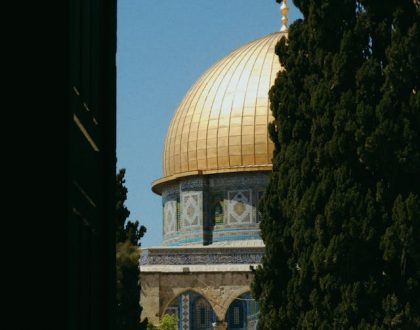Islam – a religion of ease – Tarawih reflections 27

The last revelation
‘Today, I have perfected your religion for you, completed My favour upon you, and chosen Islam as your religion.’ [5:3]
This was the last ayah ever to be revealed to the Prophet Muhammad ﷺ, on Arafah day, which was also Friday, during his Farewell Hajj.
Allah says that He has perfected His message – something He never said about any of His other books. The revelations came in gradual stages throughout time, starting with the scrolls of Ibrahim, then the Torah of Musa, then the Injeel of Isa (peace be upon them), until the final revelation, which was the Quran. Allah has perfected this message because no more Messengers will come after.
He has also promised to protect the Quran, which He did not promise about any of the previous revelations.
The Quran applies to all eras and situations
‘Perfecting’ and ‘protecting’ the message means Allah has set His rules so that they will always be relevant – for any time, any place, and any situation. Out of His mercy, he has made His message able to accommodate any difficulty.
We call this qawa’id mu’tarida, flexible rules that can accommodate different circumstances. We can also talk about fiqhun nawazil, the fiqh that deals with contemporary issues.
Ease in wudhu
‘Believers, when you intend to perform the prayer, wash your face and arms up to the elbow; wipe your head, and wash your feet up to the ankles. … But if you are ill, on a journey, or have relieved yourselves, or have been intimate with your wives and cannot find water, then purify yourselves with clean earth by wiping your faces and hands. Allah does not want to burden you; rather He wants to cleanse you and to complete His blessing upon you, that you may give thanks.’ [5:6]
This ayah lays out the obligations of wudu, but it also reminds us that Allah doesn’t want to burden us. His Shari’ah is a shari’ah of ease. The verses of siyam in Surat al-Baqarah say the same thing:
Allah intends (to provide) ease for you and does not intend (to create) hardship for you.
Al-Baqarah, Ayah 185
Both of these sets of ayahs mention travelling and illness. Allah is saying that He doesn’t want to burden us: He intends ease for us, not difficulty. From these verses, scholars have deduced the fiqh of tayseer, bringing about ease. With the important caveat that we always have to stay within Allah’s boundaries: it doesn’t mean we can just break all the rules and call it ‘ease’.
If there was no tayammum as an alternative to wudu, we would not be able to pray in a situation where we had no water. This would be a burden for the believer. (If you feel it would be a holiday to not have to pray, this is a sign of a problem in your heart!) Tayammum is a sign of Allah’s mercy, facilitating for us what is easy.
It’s also reinforcing the message that we always have to pray and be connected to Allah, no matter what.
Salah is the firewall for your soul
Shaytan is always in the background, ready to attack us the minute we don’t have protection against him. Your connection to Allah is what protects you, and salah is what connects you to Allah. The word ‘salah’ comes from silah, meaning ‘connection’.
Think of salah as your firewall: if you turn it off and disconnect yourself from Allah, you will be overrun by viruses.
Salah was not made an obligation until the journey of Isra wal Mi’raj, when the Prophet ﷺ ascended to Heaven after travelling from Makkah to Bayt al Maqdis in Jerusalem. The obligation of salah could have been revealed in any time or place, but Allah specifically revealed it to the Prophet ﷺ when he was in the Heavens. This is because salah is what elevates us to Allah: every salah is a mi’raj for a believer to their Lord.
This why Allah has made salah obligatory for us, and there are hundreds of hadith talking about the virtues and importance of salah.
Embody prophetic ease
The Prophet Muhammad ﷺ embodied the Quran in his character, and we see the same ease in his seerah. For example, during Hajj people used to come to him and tell him they had done the steps out of order or forgot something, and he would tell them it was okay.
He was reflecting ease within boundaries, the same as we see in the Quran. So we need to reflect this in our interactions with others as well. Some people’s speciality is to take anything easy and make it difficult. We need to understand that this is not the prophetic character.
We all probably know someone who is always being negative and making small things complicated. But if we are like this, we can untie this knot and train ourselves to take it easy.
When we read the seerah, the Prophet ﷺ was always described as easy mannered, always smiling. This is the character of ease, and we need to adopt this character and apply it in our lives.
We ask Allah to make us people of ease.
Based on the reflections of Shaykh Haytham Tamim
Transcribed by Hana Khan
Please support Utrujj with your donations and duas to enable us to continue spreading sacred knowledge
- The consequences of harming Awliyaullah
- If you miss Isha and wake up at Fajr should you pray Isha (qada) or wait until after Fajr?
- Can you pray maghrib if it’s nearly Isha?
- If you wake up as the sun is rising should you pray Fajr?
- How late can pray Isha?
Recommended Posts

The consequences of harming Awliyaullah
May 03, 2024

Inspirational women in Islam
May 01, 2024

The forces of Allah and the fate of the falsifiers
April 26, 2024
